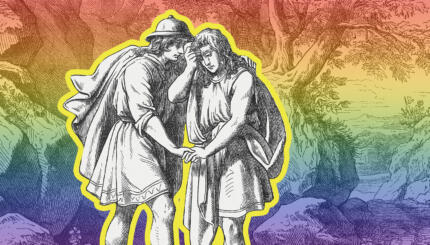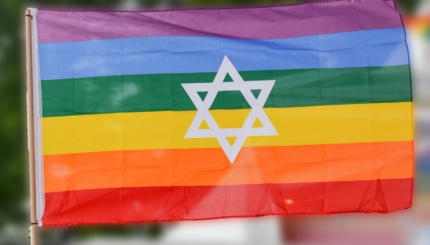Jews read sections of the Torah each week, and these sections, known as parshiyot, inspire endless examination year after year. Each week we will bring you regular essays examining these portions from a queer perspective, drawn from the book Torah Queeries: Weekly Commentaries on the Hebrew Bible and the Torah Queeries online collection. This week, Igael Gurin Malous examines the verses of Leviticus, read during Yom Kippur, most troubling to LGBT people.
Growing up I used to go to shul (synagogue) religiously, every Shabbat, every chag (festival), and every holiday. I prayed three times a day at yeshiva, got to services right when they started, and left only after they ended. I didn’t know a different way to behave.
It was around the age of 18 that I started realizing I was different from the other people around me, small things at first, the usual, really: how I interacted with other men, what I dreamt about, the kind of partner I wanted, etc. What it meant was that during Mincha (the afternoon service) of Yom Kippur I was confronted with the pasuk (Biblical verse) in Torah that hurt me the most. Leviticus 18:22:
ואת זכר לא תשכב משכבי אישה תועבה היא
Thou shalt not lie with mankind, as with womankind; it is abomination.
I feared it like nothing else. Unable then to articulate the complex relationship I had with God and Judaism, my reaction to it every year was visceral: nausea, anger and pain. I tried reading other passages. I tried services that skipped the offending verse. I tried reading a book during the service. I tried stepping out of shul in protest right before the service. Eventually, I stopped going to shul altogether.
And then, a few years back while reading the brilliant work of Saussure, I realized that there is another way, a different way of reading things. Ferdinand De Saussure distinguished between two elements of language. He called them synchronic and diachronic. The diachronic element is chronological by its nature. A diachronic investigation of the word ‘man’ in the sentence ‘all men are equal’ will reveal the historical meanings of the word separately from the sentence and the other words around it. That way we can discuss how the word evolved, where it came from, its meaning and its relevance. A synchronic investigation of the word examines the word in relation to the sentence and the other words around it. The content and message of the sentence comes from that word in relation to the other words.
So I would like to offer a diachronic reading of this infamous verse rather than a synchronic one. I’m not rejecting it, I’m infusing it with another layer of meaning. I’m reclaiming it, making it my own. I am fully aware that Saussure deconstructed sentences in order to reconstruct them at the end and I understand that I should consider the syntactic life of the pasuk, but I am leaving the reconstruction of the pasuk to you, the reader, as I would like to offer each word its own life. This is a way for me to be a member of the larger Jewish community that still reads this pasuk on mincha of Yom Kippur and yet allows me to feel that it has something to teach me, too.
ואת – ve’et – and: – is a word of inclusiveness, of joining together ideas, people and values. Giving them the same value of importance. Like me AND my partner, like my love for him AND his love for me.
זכר – zachar – male/ man/ men – is an aspect of God, it’s my sex and my gender, it’s who I am and also who I love. It’s a powerful word that reminds me to always be who I am. To be strong and yet not hard, to be giving but not a martyr, to feel I can do anything but know my limits.
לא – lo – no – is the word that I use to reject the ideas I cannot live with, it’s a mantra reminding me that I can change the world!
תשכב – tishkav – lay / sleep with – from the Hebrew root ב. כ. ש (shin, kaf, bet) reminds me of the pasuk in Kings 1, 2:10-11 “Then David rested with his fathers and was buried in the City of David, He had reigned forty years over Israel—seven years in Hebron and thirty-three in Jerusalem,” reminding me that life is short and that Yom Kippur is an awesome day, one filled with God’s presence. It’s a chance to reflect on my year and my actions, to make new resolutions and to challenge myself to be a better person.
משכבי – mishkavei – sex – again from the Hebrew root ב. כ. ש (shin, kaf, bet) But this time I interpret and use the root and the word differently. This time it does not just evoke laying down. I’m reading this word as I would in modern Hebrew, pointing me to sex. I’m reminded of the midrash in Bereshit Rabba (9:9) that says that without yetzer hara (in this case meaning sex drive) a person would not find a partner and build a home and family. This amazing midrash allows us a glimpse into the ancient rabbis world and how they viewed things that frightened them and were challenging to them. Those rabbis, even with that fear, knew that they must embrace the yetzer hara, that it’s a life force, a necessary “evil.”
אישה – isha – woman / female – is an aspect of God, a sex and a gender. It’s a powerful word that reminds me to always be who I am. To be strong and yet not hard, to be giving but not a martyr, to feel I can do anything but know my limits.
תועבה – toeva – abomination – Latin, From ab (“of, by, from”) + ōminor (“forebode, predict, presage”), from ōmen (“sign, token, omen”), teaching us that what is described in this chapter is a sign from God. All actions have God in them! These are omens, tokens that remind us of God in this world.
היא – he – it is so – I read it as a command to define each of those words, to deconstruct them and find new meaning to verses and sentences, to challenge myself always with the words of Torah. Even if these words make me feel uncomfortable. To wrestle with it, to truly be Israel, wrestling with the angel in the night.
Torah
Pronunced: TORE-uh, Origin: Hebrew, the Five Books of Moses.


